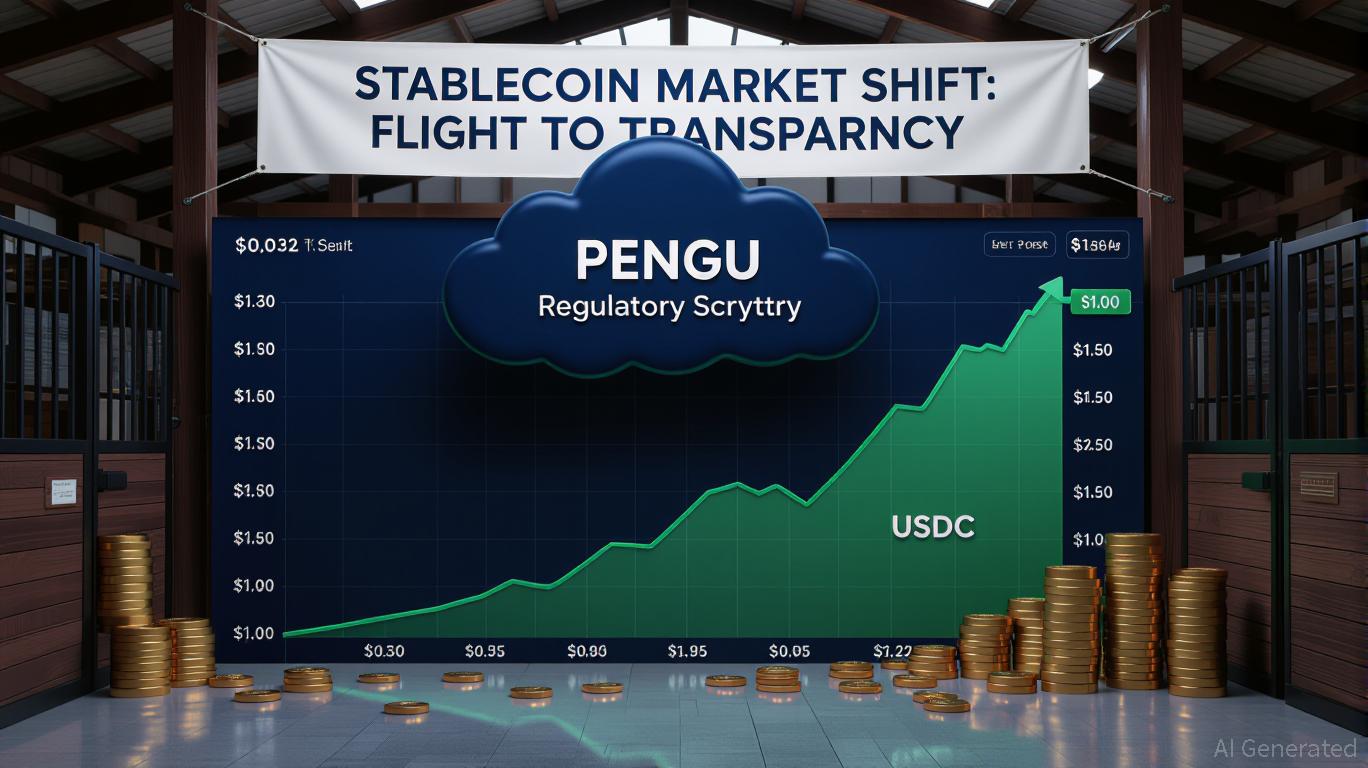The PENGU USDT Sell Alert: Is This a Temporary Market Dip or the Start of a Downtrend?
- PENGU USDT's Q3 2025 depegging (28.5% drop) exposed liquidity risks from opaque collateral and high-yield incentives, triggering cascading DeFi liquidations. - Investor flight to transparent stablecoins like USDC/USDG accelerated post-GENIUS Act/MiCA, with PENGU's governance opacity making it a pariah in 2025's regulatory climate. - November 2025 data shows algorithmic stablecoins face structural crisis as redemption rates spike, with PENGU failing to reclaim key support levels despite temporary October
Liquidity Dynamics: An Unstable Base
PENGU USDT’s depegging incident in the third quarter of 2025—a 28.5% price plunge—revealed significant flaws in its framework. Heavy dependence on high-yield rewards and unclear collateral backing left the token vulnerable to redemption surges, leading to a chain reaction of liquidations across DeFi platforms
Although PENGU saw a brief 12.8% recovery in late October 2025 as the broader crypto market improved,
Investor Behavior: Seeking Security
Market participants are increasingly gravitating toward stablecoins with transparent collateral and regulatory backing. The implementation of the U.S. GENIUS Act and the EU’s MiCA rules has accelerated this movement, channeling funds into compliant assets such as
Data from November 2025 shows a broader shift: stablecoin usage is surging, led by Gen Z investors. New tools like Bluwhale’s AI Stablecoin Agent, introduced in November,
Correction or Reversal? A Structural Perspective

The sell-off in November 2025 is more consistent with a bearish reversal. PENGU’s liquidity struggles are part of a wider issue affecting algorithmic stablecoins. Unless there are significant improvements in collateral clarity, governance, and regulatory compliance, the token’s future remains uncertain.
Conclusion
The downturn in PENGU USDT is more than a simple correction—it signals a fundamental bearish shift. Liquidity issues, investor preferences, and regulatory developments all suggest a major reassessment of algorithmic stablecoins. For investors, the takeaway is to focus on stablecoins with clear collateral and regulatory approval. For PENGU, urgent changes are needed to avoid becoming obsolete in a market that is increasingly cautious about risk.
Disclaimer: The content of this article solely reflects the author's opinion and does not represent the platform in any capacity. This article is not intended to serve as a reference for making investment decisions.
You may also like
Stablecoin Market Exceeds $280B as ECB Warns of Potential Systemic Risks
- Stablecoin market exceeds $280B, driven by regulatory clarity and institutional adoption, capturing 8% of crypto assets. - ECB warns of systemic risks from stablecoin concentration, de-pegging events, and mass redemption "runs" threatening global markets. - USDC overtakes USDT in onchain activity due to regulatory alignment, with Circle's market cap rising 72% YTD to $74B. - ECB calls for global regulatory coordination to address cross-border arbitrage gaps and prevent destabilizing retail deposit shifts

Bitcoin News Update: MicroStrategy Faces an Identity Dilemma—Is It a Technology Company or a Bitcoin Holding Entity?
- MicroStrategy faces potential MSCI index reclassification as a Bitcoin investment vehicle, risking $8.8B in passive fund outflows. - The debate centers on whether crypto-heavy firms should be classified as operating businesses or passive funds, impacting capital access and valuation. - CEO Michael Saylor defends MSTR as a "structured finance company," leveraging Bitcoin-backed securities to differentiate from passive vehicles. - Compressed stock-to-NAV multiples and Bitcoin's price slump threaten MSTR's

Japan Sets Out to Rebuild Investor Confidence in Crypto Following Significant Security Breaches
- Japan's FSA will mandate crypto exchanges to hold liability reserves proportional to trading volumes and security risks, modeled after traditional securities safeguards. - The reform responds to major breaches like the 2024 DMM Bitcoin hack ($312M stolen) and allows exchanges to offset reserve costs via insurance policies. - New rules require segregating user funds from corporate assets and reclassify crypto as securities under the Financial Instruments Act to enable investment products. - Experts view t

Bitcoin News Today: Bitcoin's Rebound Fails to Ease Crypto's Liquidity Crunch
- Bitcoin's $80,000 rebound failed to reverse crypto's liquidity crisis as structural risks deepen amid macroeconomic pressures and thinning market liquidity. - Total crypto market cap fell below $3 trillion with $950M+ liquidations, while Bitcoin's dominance dropped below 49% as capital rotated into altcoins like HBAR and HYPE. - Institutional divergence emerged: spot ETFs saw $1.38B redemptions while on-chain accumulators added 42,000 BTC, contrasting with long-term investors offloading ~42,000 BTC this
